|
The Evil of Frankenstein (1964)
Synopsis:
|
Frankenstein
and his new assistant Hans return to the Baron's hometown Carlstaad, where they find
his castle ransacked and his property confiscated. After a confrontation
with the burgomaster and the police chief - Frankenstein accuses
them of stealing from his house - they have to flee the town. A mute
beggar girl offers Frankenstein shelter in the cave where she
dwells. There Frankenstein by chance discovers his supposedly dead creature frozen in a block of
ice in a remote mountain cave. The Monster is thawed out and brought back to life
at the Baron's lab. Frankenstein then hires the hypnotist Zoltan to reactivate the Monster's brain and to
train it. However, Zoltan, who has now full control over
Frankenstein's creature, uses the monster to take revenge on the town
burgomeister and even manages to frame Frankenstein for it. Eventually,
though, the creature turns against Zoltan and kills him. The mute girl
helps the Monster escape and Frankenstein is arrested for the murder
of the burgomaster and a police officer. Frankenstein manages to
escape from prison and sets out to his chateau to protect his
creature from an enraged lynch mob of townspeople. Meanwhile the
Monster discovers some bottles of brandy and empties several of
them. Completely drunk, the Monster then thrashes the lab and starts
a fight with Frankenstein. Mistaking a bottle of chloroform for
brandy, the alcohol-loving Monster drinks it and, writhing in agony,
starts a fire at the lab. In the ensuing explosion both the Monster and Frankenstein perish,
while Hans and the mute girl are able to escape.
|
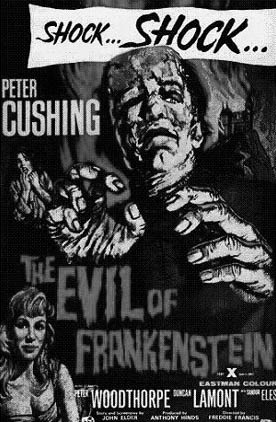
Evil of
Frankenstein movie poster |
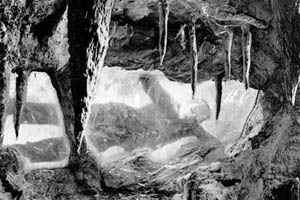
Ice, ice, baby: The Monster is waiting to be
thawed out
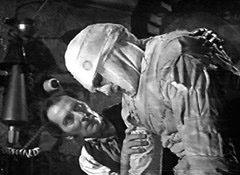
Birth is always painful:
Frankenstein and his Monster
|
Although 1964's The Evil of Frankenstein is part of Hammer's
official Frankenstein
series, the screenplay written by producer Anthony Hinds cuts off all connections
with the previous films. There is even a flashback contradicting the first
two films and rather connecting it to Universal's series. It shows the
baron in a highly sophisticated laboratory where he gives life to
his creature. This Monster is later chased by villagers and plunges
to its supposed death into a cave. Evil of Frankenstein never
picks up the events from 1958's Revenge of Frankenstein, in
particular the fact that Frankenstein has already successfully
completed several experiments involving the creation of artificial
life, the last of them being his own re-animation in an artificial
body.
The
Baron is again played by Peter Cushing,
but this time he seems more humane than in past films. He is shown on the run from ignorant
villagers who constantly sabotage his work. Unlike in Hammer's other
movies, this time Frankenstein is allowed to express his suffering.
When he discovers that his castle has been looted by villagers he
whines, "Why can't they leave me alone?"
The movie's real
villain is Zoltan, a drunkard who uses the creature for his own purposes,
very much like Bela Lugosi's Igor in Universal's Son of Frankenstein. The
Baron on the other hand, is less concerned with creating monsters than trying
to evade detection by local authorities. |
Unlike the other Hammer Frankenstein films, The Evil of Frankenstein was not directed by Terence
Fisher but by Freddie Francis, an acclaimed director of photography.
(Francis later worked as a D.O.P. for Martin Scorsese and David
Lynch.) He replaced Fisher, who at the time of filming was seriously ill. But
Francis' sometimes uninspired direction is not the main reason why The Evil of Frankenstein is often
regarded as the worst entry in
Hammer's Frankenstein series. Its most serious flaws are the rather simple
plot and a complete lack of characterization. The Monster's is
simply a brute killing machine acting on remote control under the
influence of the hypnotist. Kiwi Kingston, a professional wrestler,
may not have been a real actor, but he is also not given any chance
to do something with his role apart from grunting and imitating
Karloff's walk. Zoltan is greedy and ruthless, we learn nothing
about his past and the reasons for his grudge with the town's
authorities are rather dubious. There is no explanation whatsoever
why a mute beggar girl would help a man like Frankenstein,
especially when she has never met him before. Finally, the relationship between Frankenstein and his assistant is never
really explained.
Being widely regarded as a negligible entry in Hammer's series due
to its lack of continuity within the series,
The Evil of Frankenstein is still of interest where production is concerned. In
order to increase its reputation as the leading
"House of Horror" Hammer teamed up with Universal Films for this
production. As a result Hammer were allowed to use Universal's monster
design from the 1931 film. The monster looked very much like Boris Karloff's classic make-up
(although some might say that it was more like a cheap imitation made out
of papier mâché) but the uninspired plot did not live up to the expectations of the movie
fans.
There is also an alternative TV version of The Evil of Frankenstein,
which misses some of the more "intense" scenes, but instead includes
several additional scenes shot by a different director. These 13
minutes were filmed with new actors and do not contribute anything
to the plot, since they were only shot in order to add length for TV
broadcast. |
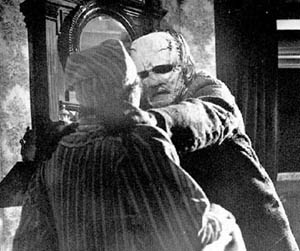
Out for blood: the Monster is after the
burgomaster |
|
Cast & Crew: |
|
| |
|
|
Victor Frankenstein |
Peter Cushing |
| Mute Girl |
Katy Wild |
| Hans |
Sandor Elès |
| Zoltán the Hypnotist |
Peter Woodthorpe |
| Monster |
Kiwi Kingston |
| |
|
| |
|
|
Screenplay |
Anthony
Hinds |
|
Music |
Don Banks |
|
Cinematography |
John Wilcox |
| Producer |
Anthony
Hinds |
| Director |
Freddy Francis |
|
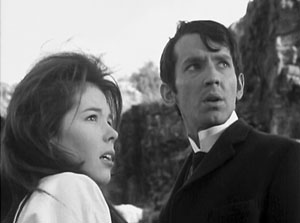
The mute beggar girl (Katy Wild) and Hans (Sandor Elès) |



|


